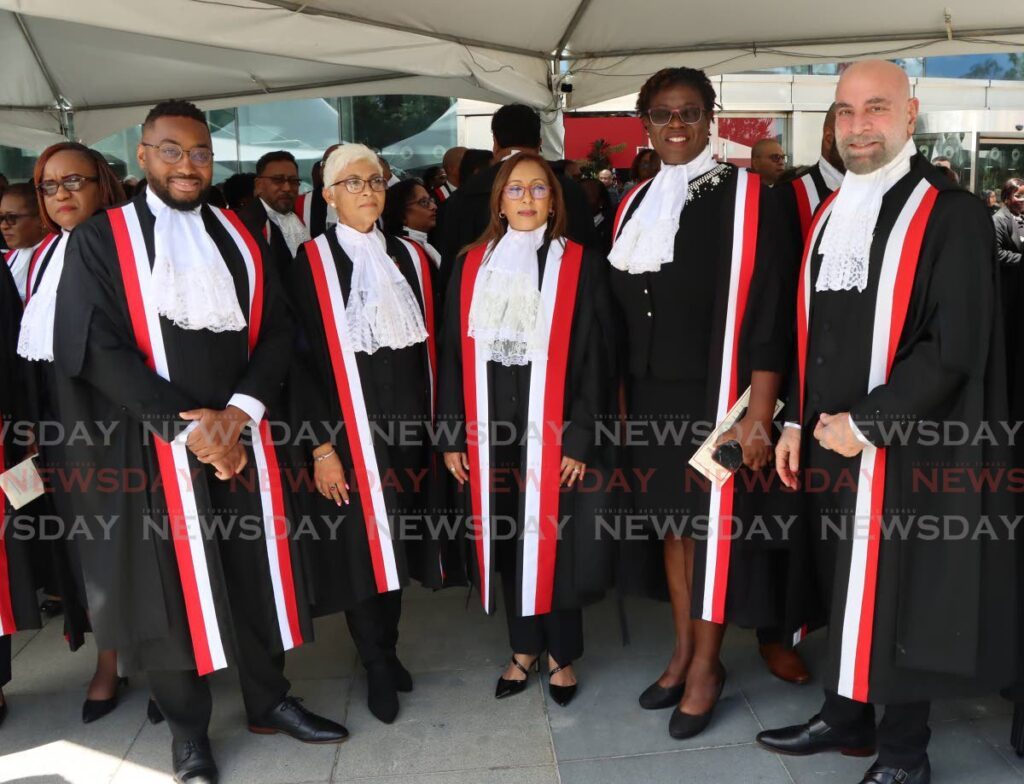8 years after Imbert's promise, still no financial autonomy for Judiciary

FINANCIAL autonomy for the Judiciary is a recurring appeal made by Chief Justice Ivor Archie at the beginning of the law term each year.
Finance Minister Colm Imbert promised it in 2015, but it is yet to materialise.
The Judiciary's finances are currently managed by the Government, which Archie calls "those who control the purse strings."
In fact, Archie mentioned it again at the opening of the 2023/2024 law term on Friday as well as another major hurdle of being allowed full autonomy to hire specialised staff and offer competitive salaries.
This is one reason he gives for the Judiciary not fulfilling as much as it would like to. He has referred to the situation as "an erosion of judicial independence."
Some of the challenges include staffing woes – recruitment and retention – as well as case delays and backlogs.In the Judiciary's 2020/2021 report, it said there were 5,992 pending cases at the Civil High Court, and 10,507 pending non-contentious probate matters.
A total of 1,278 remained pending at the Criminal High Court, 8,424 at the Family Court, 1,057 at the Children Court and 3,902 appeals at the Court of Appeal.
Some of those pending cases had been over a decade old.
In 2015, in the 2016 budget, Imbert said the government would assist the judicial system by introducing video conferencing at Remand Yard and a pilot project in which lay magistrates will address minor offences to "reduce the burden" on the magistrates courts.
But he also said, "Most importantly...to improve the efficiency of the administration of justice, we intend to give the Judiciary the financial autonomy that it has asked for, for so many years, coupled with the ability to manage its own resources, projects and programmes."
He promised "detailed consultation" in 2016 "to achieve consensus on practical and workable mechanisms."
In 2016, Archie said Imbert's declaration was "an encouraging sign," but warned the transition could not be achieved overnight.
"The capacity to handle full autonomy in an appropriately accountable manner requires, among other things, amendments to relevant legislation, increased capacity and control over hiring and human resources and engagement of all stakeholders including representative unions."
But he said the conversations had started, and "concrete steps" were made on short-term measures, hoping the change could be completed by 2018.
In 2017, the Judiciary was short of six statistical clerks, which he said was because of "the powers that be." He said the Judiciary should be able to control its human resources "as a necessary adjunct to financial autonomy."
In 2018, Archie said at the core of the Judiciary's strategic realignment was a 2016 document on its financial and administrative authority, on which the executive and the Judiciary had agreed, "as it does require significant structural adjustment and some legislative reform...we are already committed to this course."
But he addressed the topic again in 2019, asking why there had been no progress "despite the absence of any known reasoned objections."
He said he remained optimistic on "the full adoption of the framework for judicial autonomy that has been languishing for far too long."
But in 2020, he said financial autonomy had been sought "for ages" and referred to Imbert's 2015 speech.
He said he had asked the US National Centre for State Courts and the UNDP Office in TT to work jointly towards the provision of a framework for "smooth and effective implementation of the government’s stated intent."
He renewed the call – yet again – in 2021, saying the request went as far back as 1982.
"Our colonial forebears had established a commission to look into the functioning of the Registrar’s Office in Trinidad...and it was concluded that the registry should have been a closed shop given the special requirements such as skill sets and the need to retain these skill sets. Nothing has changed since then," he said.
He added, "It has grown worse in the Judiciary in respect of our freedom to manage our own affairs."
In October 2015, the president of the Law Association (LATT), now Attorney General, Reginald Armour, SC, said the association had "long been in the forefront of promoting and supporting the call" for financial autonomy.
Calling it an "inseparable institutional component of an independent judiciary," he welcomed Imbert's "commitment."
He added that this has been requested by successive CJs since independence.
"This commitment is an important step in enhancing the institutional independence of the Judiciary, in addition to enabling it to deliver on the very many pressing initiatives and reforms necessary for the improvement of the administration of justice, including the criminal justice system.
"It will fall to the Judiciary to ensure that this new budgetary responsibility is accompanied by established protocols that promote transparency, efficiency and accountability."
Imbert presented the 2024 budget on Monday.
A total of $98.2 million will be allocated to the Judiciary to create strategies to enhance delivery, reduce case backlogs and delays. In addition, $7 million was allocated to creating a "comprehensive security system" in the Judiciary, and $12 million for repurposing and refurbishment work at several courts. Another $4 million was allocated for the development of customer service centres.
The overall fiscal 2024 allocation is $750,660,540.
President of the Criminal Bar Association Israel Khan, SC, told Newsday he does not think the government will deliver on the promise of financial autonomy any time soon.
"It will never happen," he said, later adding, "...Unless the economy is booming. They will have money in the treasury and continue giving them piece-piece."
Newsday tried to contact LATT, the Finance Ministry, the Judiciary, Imbert and Armour for comment, but calls and messages went unanswered.

Comments
"8 years after Imbert's promise, still no financial autonomy for Judiciary"